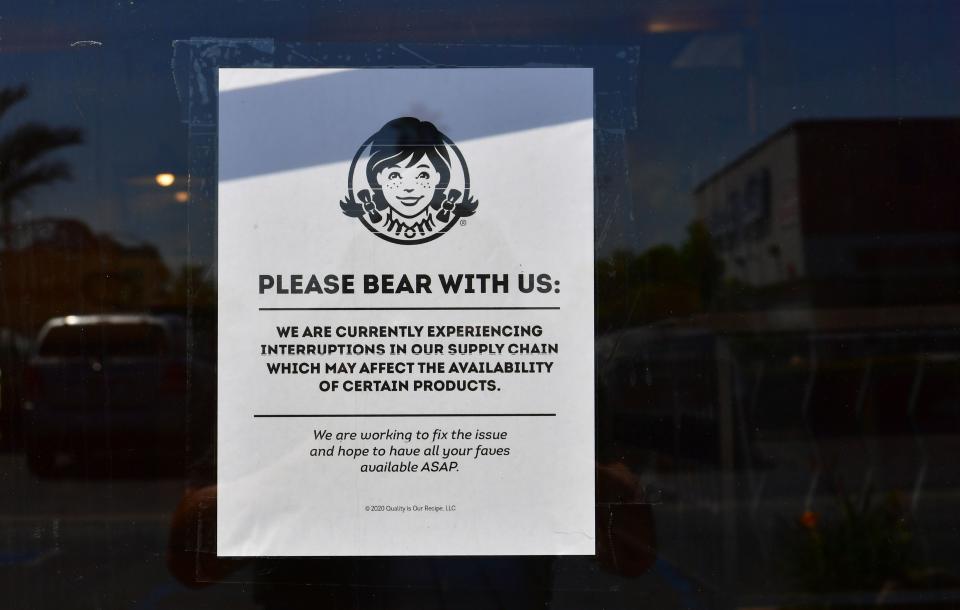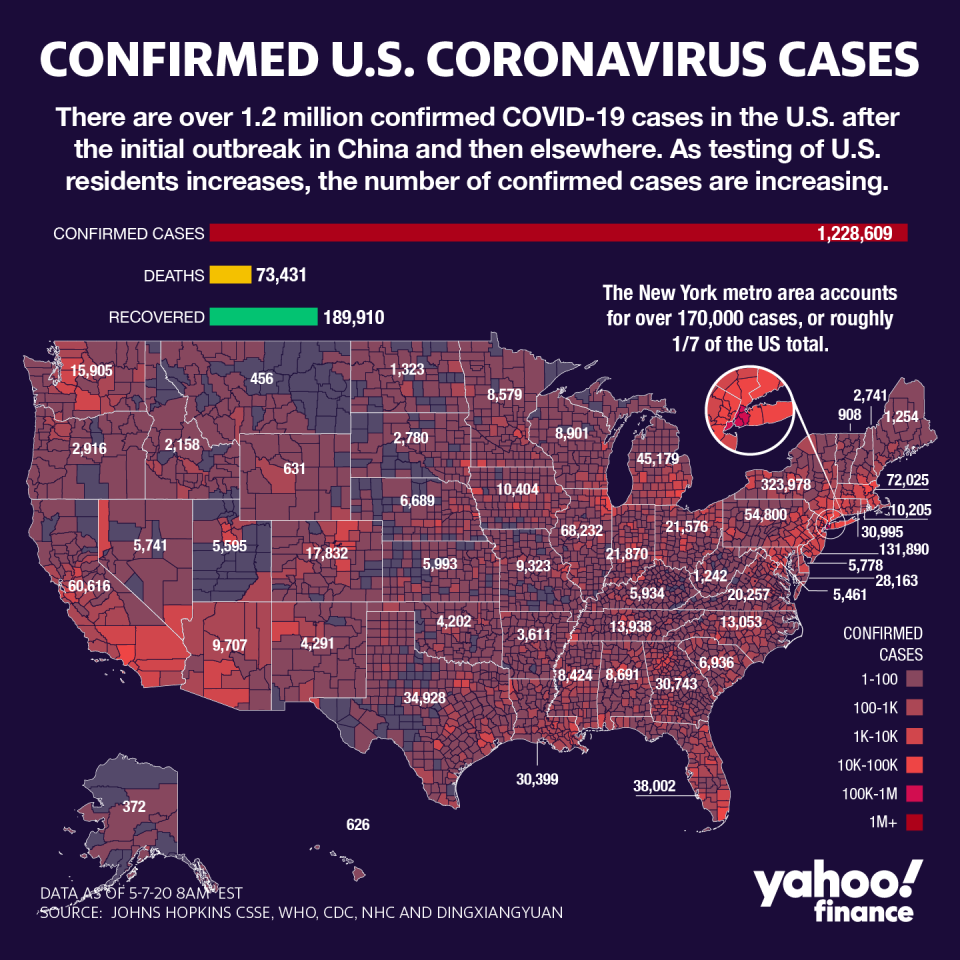Union president blasts President Trump's meatpacking plant move as 'outrageous'
When President Trump signed an executive order last week to keep meat processing facilities open amid the coronavirus pandemic, many people rejoiced since it meant there would be no disruption to the food supply chain.
But Stuart Appelbaum, the president of the Retail, Wholesale, and Department Store Union — which represents workers in food processing, retail, and light manufacturing industries — lambasted the move.
“That decision was outrageous and was the wrong thing to do,” Appelbaum told Yahoo Finance. “What President Trump’s action does is to require plants to stay open, even if there are serious reasons for them to be closed by state or other authorities when a plant is closed for the purposes of deep cleaning and protecting the safety and lives of working people. And Trump is saying he’s not going to allow that to happen. It’s the wrong decision because the best way to protect the food chain is to protect the safety of the workers.”

Trump invoked the Defense Production Act (DPA) to keep the facilities open. The DPA, signed into law back in 1950, allows the government to have more control over industrial production during emergencies.
The president said his decision was necessary because “such closures threaten the continued functioning of the national meat and poultry supply chain, undermining critical infrastructure during the national emergency.”
The issue has become more apparent over the last few days, as fast food chain Wendy’s began experiencing sell-outs of its beef products at nearly 20% of its locations around the country.

Hog farmers are happy with the move
Jim Monroe, the assistant vice president of communications at the National Pork Producers Council, called Trump’s move a “positive development” for hog farmers.
“It prioritizes plant operations, and hopefully we’ll start seeing hogs moving at a more rapid pace to plants and into the food supply,” he told Yahoo Finance. “Even backing up before the COVID situation, we were already facing a plant capacity issue because of labor shortages in our plant communities and in our farm communities. So then COVID hits and then we start seeing plants actually closing and slowing down operations. Obviously, the plant capacity issue became very severe.”
According to the United Food and Commercial Workers Union (UFCW), one of the largest labor unions in the country, there have been over 5,322 cases and at least 72 deaths among UFCW’s 1.3 million members who work in grocery, retail, pharmacy, meatpacking, and other industries.
“They’re frightened,” Appelbaum said of these workers. “They’re frightened to go to work and they’re frightened not to go to work because they don’t know how they’ll support themselves if they’re not at work. It’s a terrible choice they’ve been forced into. And I think the choice is made worse because they’ve seen what’s happened. They’ve seen the people dying, they’ve seen the hundreds of people getting sick, and they no longer trust their employers to keep them safe.”

Protecting both workers and the supply chain
The UFCW is calling on the White House to ramp up testing for workers, access to protective equipment, and federal oversight.
“We can protect both the food chain and working people, but we have to start doing it immediately,” Appelbaum said. “We have to start making these plants safe places to go to work each day. These are rough jobs. These are terrible jobs at the best of circumstances, but nobody should feel that they have to put their life on the line just by showing up at work.”
He continued: “They also have to do other things. They have to do testing before they go to work, and if anyone’s sick, they shouldn’t be going into the plant. There has to be testing and there have to be safe work conditions. And if that means you have to close down a plant temporarily to disinfect it, you are protecting the food chain supply for the long term.”

Tyson Foods Chairman John Tyson warned of food supply chain disruptions that would come as a result of facilities closing down.
“This means one thing — the food supply chain is vulnerable,” he wrote in full-page ads for The Washington Post, New York Times, and Arkansas Democrat-Gazette. “As pork, beef, and chicken plants are being forced to close, even for short periods of time, millions of pounds of meat will disappear from the supply chain.”
At one Tyson Foods plant in Tennessee, there were 298 confirmed cases of coronavirus among employees. Another plant in Waterloo, Iowa, was linked to 182 cases in the area.

“If there’s an outbreak in a plant, you need to contain it by doing a deep clean to prevent further infections and then you need to maintain high safety standards,” Appelbaum said. “You have to have real social distancing because no matter what else you do, unless there’s adequate social distancing, it’s not going to be effective. Plexiglass barriers are a good step, but they’re not sufficient. You still need social distancing.”
Other measures he suggested were giving people more access to handwashing — which means adequate breaks — and ensuring that when people are sick, they know they shouldn’t come to work and won’t have to worry about being paid.
“We need to respect them and the dignity of the work,” Appelbaum said, adding: “Many of these workers have for a long time lived in the shadows and have been invisible. What people have to understand is that their work is important. It should be valued and they should be treated with dignity and respect, and that they’re entitled to proper safety and proper compensation for the work they do. And I hope that this realization carries over when we get to the other side of this pandemic.”

‘A tremendous economic hit’
Hog farmers, for their part, stressed the enormous challenges as a result of the coronavirus and meat processing closures.
“Economically, when [the virus] started to hit, the prices went basically straight down on all the commodities we produced, from pork to soybeans to corn, along with other farmers, dairy, beef,” Brian Duncan, a hog farmer and the vice president of the Illinois Farm Bureau, told Yahoo Finance. “No farmer’s been spared in this. When our markets… 60% of the food is consumed away from home and those businesses are closed. People eat differently when they eat at home and the quantities and the cuts are different. It’s been a tremendous economic hit.”

The other problem as a result of the supply chain disruption is that these farmers have too many hogs on their farms and nowhere to send them. Monroe explained that this creates a situation from an animal welfare perspective.
“It’s harder to make sure every animal has enough feed, enough water,” he said. “They can’t rest comfortably. It can lead to aggressive behavior among pigs and you start facing injuries. So the only option, sadly, that farmers have in some cases is to euthanize the animals.”
Monroe and Duncan both argued that worker safety has to be top priority among meat producers.
“I think the workers that are in those plants need to know that they’re safe there as they do,” Duncan said. “That’s an incredibly valuable job they perform.”
Adriana is a reporter and editor for Yahoo Finance. Follow her on Twitter @adrianambells.
READ MORE:
Economist: Trump's immigration halt amid coronavirus 'will harm the U.S. economy'
Coronavirus pandemic 'threatens to make the opioid crisis substantially worse'
Read the latest financial and business news from Yahoo Finance
Follow Yahoo Finance on Twitter, Facebook, Instagram, Flipboard, SmartNews, LinkedIn, YouTube, and reddit.

